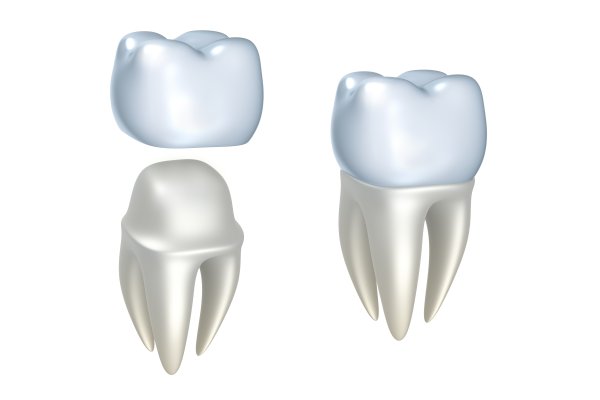Dental Crowns: How Long Do They Last?

Dental crowns involve an intensive fitting procedure and often yield fantastic results for a smile. It is reasonable, then, to wonder how long a crown should last. Here is a brief summary of how long a dental crown’s average lifespan is, as well as some information about how a crown can be made to last longer.
How long do dental crowns last?
To be straightforward, a dental crown will not last forever, no matter how well it is fitted. The good news, however, is that they usually last a long time.
A crown’s average lifespan
Professionally-fitted dental crowns usually have about five to 15 years of longevity on average. Crowns are made of resilient materials, like porcelain or metal alloys, which allows them to stand up to a lot of potential wear and damage. Of course, crowns are also not indestructible, and they may need to be replaced for a variety of reasons.
Common reasons for replacement
A crown is in need of replacement when it showcases one or both of the telltale signs of significant damage or dental issues. Damage to the crown is often visible in the form of chips or cracks on the crown’s surface. These can be dangerous for several reasons. For one, chips off a crown can cause injury to the mouth due to sharp edges, or could even injure the throat if swallowed. A damaged crown also may create an opening through which the tooth it protects could be exposed to infection.
The second sign a crown needs replacement is any new pain, signs of infection or development of plaque around the base or ridges of the crown. This is an indicator that the tooth beneath may be infected or further damaged, and warrants both a replacement and dental attention to the tooth in question.
A crown’s lifespan can be extended
Thankfully, there are some steps that can be taken to extend a crown’s life. While it is not guaranteed your crown will last forever, proper care for it can keep it pearly white for several years.
Avoiding harmful habits
Dental crowns can be needlessly damaged by habits, including those a patient might not even be aware that they have. Examples of harmful habits to a crown’s health are improper or no brushing and flossing, habitual teeth grinding or chewing on hard objects.
The importance of regular dental visits
Consistently seeing a dentist for scheduled dental checkups and cleanings are also an important factor in a crown’s longevity. Dentists have the tools necessary to care both for natural teeth and dental crowns, and regular cleanings help to ward off any new infections that could develop in the mouth and spread, endangering both the crown and the tooth beneath it. A well-followed regimen of home brushing and flossing in conjunction with dental visits can keep a crown in place for years to come.
Do you currently need dental crowns?
If you are currently in need of dental crowns, we invite you to contact our office today to schedule a consultation with a dentist.
Request an appointment here: or call Anderson Family Dentistry at (530) 365-3351 for an appointment in our Anderson office.
Check out what others are saying about our services on Yelp: Read our Yelp reviews.
Recent Posts
Dental crowns involve an intensive fitting procedure and often yield fantastic results for a smile. It is reasonable, then, to wonder how long a crown should last. Here is a brief summary of how long a dental crown’s average lifespan is, as well as some information about how a crown can be made to last…
Teeth grinding, or bruxism, can occur due to many reasons. Common causes are an abnormal bite, missing or crooked teeth and stress.Often people have no idea they are grinding their teeth since it commonly happens during sleep. If grinding goes unnoticed for a long time, it can lead to severe damage and pain. The earlier…
After finally deciding to replace your lost tooth with a fixed dental bridge, you are left with the question: how do you care for your new dental restoration? Getting a new, healthy smile can be a little overwhelming and a big confidence booster. If you want to preserve the new smile and keep your teeth…
A root canal treatment is used by a dentist to deal with severe cases of tooth decay. It is the last course of action before extraction becomes inevitable. Tooth decay is caused by parts of a tooth being eaten away by acids in the foods a person consumes and those produced by oral bacteria.The earlier…

